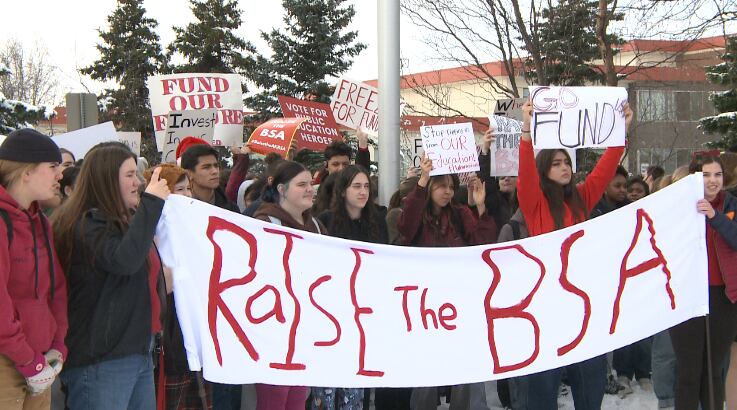Governor Labels School Leaders 'Hysterical' Amid Deficit Budget Submissions

Alaska School Districts Face Severe Financial Challenges
As school district budgets are due to the state, Governor Mike Dunleavy has criticized education leaders as “hysterical” while school leaders finalize budgets that include steep deficits and drained reserves. Superintendents have been making difficult budget choices to ensure student success and safety.
Dunleavy emphasized that local school districts decide how to spend the funding provided by the legislature and governor. He stated, “Rest assured that regardless of what you hear from your local school district, class sizes will be reasonable, teachers will teach, and school activities will continue.” However, local school districts have reported needing to make “impossible” decisions to keep the lights on amidst the governor’s cuts.
Rebecca Hurbi, Executive Director of Communications for the Fairbanks North-Star Borough School District, highlighted the devastating impact of these decisions on the community. She said, “It’s really hard as a community to have those public education impacts to close schools and to have to move students around, to have to move staff around, to have to cut teachers.”
Superintendent Scott Ballard of Akiachak’s Yupiit School District shared similar concerns. He explained, “If a school loses diesel generators to keep that school warm, we can’t replace that boiler if we don’t have money. If we have to rebuild the boiler, we don’t have the money. If we need to improve our system for fire protection because it’s not up to code, we do not have the money to do that.”
Funding from the state government is not the only factor affecting the budgets. School leaders also face multiple revenue threats from potential local restrictions and federal funding cuts.
Education Funding Veto
Governor Dunleavy line-item vetoed about $51 million in education funding on June 12, which was highly contentious during its initial passage. Lawmakers eventually voted to override the governor’s veto. In a press release, the governor called opposition to the veto of per student funding, known as the Base Student Allocation, “merely rhetoric.” He stated, “The partial veto of the BSA increase was carefully considered and necessary given falling oil prices resulting in less funding available.”
The special session includes “education reform” as a central piece for discussion, but the governor’s spokesperson confirmed that the bill’s contents will not be revealed until the first day of the session. Legislators are more focused on the potential of another veto override.
To ensure his veto survives, the governor’s spokesperson confirmed that Dunleavy has told the minority party to skip the first five days of the special session—the only days the legislature could override vetoes under Alaska statute. It would take 45 lawmaker votes to override Dunleavy’s vetoes. If all 25 minority lawmakers skip, a line-item veto override is impossible.
Sen. James Kaufman, R-Anchorage, has indicated he will return to the session and vote in favor of a veto override, like he did during the previous override. However, the governor has not publicly commented on the subject and has denied multiple interview requests.
Local Funding Rule Proposal
In addition to the funding cuts, the Alaska state school board has been considering changing a rule limiting the amount of money cities and boroughs can use to fund schools in their districts. Under the new rule, cities and boroughs at or near their donation limits, like Anchorage and Juneau, would see their invested funding reduced. The rule redefines the definition of “local contribution” to match the definition used by the Impact Aid program.
Jharrett Bryantt, superintendent of the Anchorage School District, warned that this emergency regulation could result in tens of millions of fewer dollars for students across the state. The rule was postponed at the beginning of June, with a 30-day public comment period opening. The board chair, James Fields, expressed concern about rushing decisions without proper consideration.
Federal Funding Cuts
President Donald Trump has long vowed to slash spending in the federal government, and on May 2, he unveiled a budget detailing billions of dollars in education funding cuts. One of these cuts targets Migrant Education and Special Programs for Migrant Students, which is slated to lose $428 million.
Michael Lee, Superintendent of the Delta Greely School District, expressed concerns about the compounded effects of the governor’s cuts and the proposed federal cuts. He noted that with both cuts in place, the district may face significant budget shortfalls in the future.
In addition to the president’s proposed cuts, the Trump administration withheld $6 billion in federal education funding to states and local schools meant to be available July 1. Twenty-four states and the District of Columbia filed a lawsuit against Secretary of Education Linda McMahon and Trump, claiming the education funding freeze is “contrary to law, arbitrary and capricious, and unconstitutional.” Alaska was not mentioned in the suit.
Post a Comment for "Governor Labels School Leaders 'Hysterical' Amid Deficit Budget Submissions"
Post a Comment